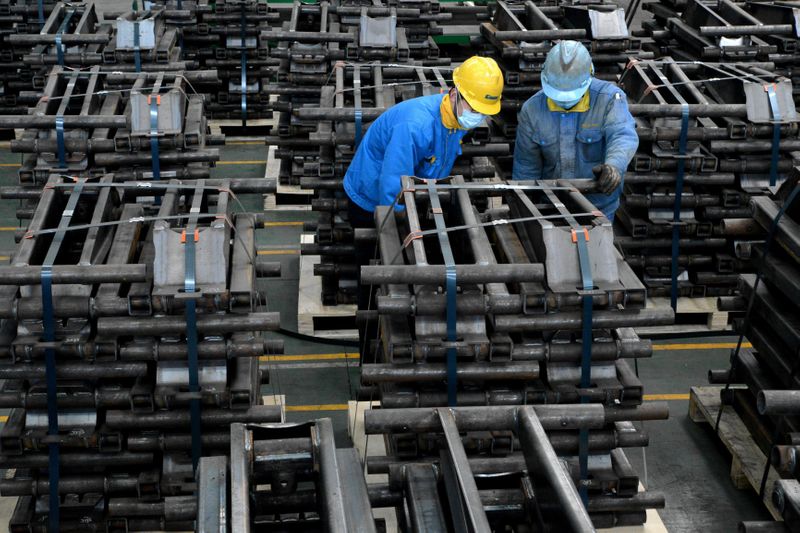BEIJING (Reuters) - Profits at China's industrial firms fell in March although at a slower pace than in the first two months, with many sectors seeing significant declines, suggesting the economy is still struggling to resume production after the coronavirus outbreak.
The world's No.2 economy is limping back after weeks of near paralysis caused by the health crisis and tough containment measures, but recovery has been patchy with worries about a second wave of infections and a global recession adding to the challenges for policymakers.
China's industrial firms earned 370.66 billion yuan ($52.43 billion) in March, down 34.9% from a year earlier, data from the National Bureau of Statistics showed. This follows a 38.3% slump in January-February, the steepest drop since at least 2010.
For the quarter ended March, industrial firms' profits fell 36.7% on an annual basis to 781.45 billion yuan.
Electronics and drinks manufacturers saw some recoveries in profits from the first two months, the data showed. Eight out of 41 sectors surveyed marked profit increases in March, better than only four in January-February.
The advanced manufacturing sector, as well as private, small-scale and foreign invested companies all saw narrower drops in profits in March compared with the first two months.
But we still cannot be optimistic about the profits situation, said Zhang Weihua, an official at the bureau.
Market demand has not recovered completely, and production costs remain relatively high, Zhang said in a statement published alongside the data.
The deep drop in industrial firms' profits comes as China's economy shrank for the first time since at least 1992 in the first three months. Factory gate prices, a key barometer for industrial demand, posted the deepest deflation in five months in March.
"China has faced a continued fall in demand for goods from foreign economies due to COVID-19's impact on those economies' job markets and wages growth," said Iris Pang, chief economist, Greater China for ING.
"Industrial profits will have to rely more on domestic demand. But conditions are not much better in China."
RELIEF MEASURES
Beijing has stepped up tax and credit relief for virus-hit firms since February, including cuts in borrowing costs.
However, top policy advisers are still calling for stronger fiscal stimulus as soon as possible.
Beijing's policies are less aggressive than the quantitative easing of other major central banks and it balances the need for stimulus against high household and corporate debt
Chinese President Xi Jinping has said Beijing will step up investment in traditional industries such as transportation and energy as well as new infrastructure areas including 5G and artificial intelligence to boost the economy.
Earnings at China's state-owned industrial firms were down 45.5% on an annual basis for January-March, versus a 32.9% fall in the first two months, the statistics bureau data showed.
Liabilities at industrial firms rose 5.4% on year at end-March, versus a 5.3% increase as of end-February.
Private sector profits fell 29.5% in the first three months, improving from January-February's 36.6% slump.

The industrial profit data covers large firms whose annual revenue exceeds 20 million yuan from their main operations.